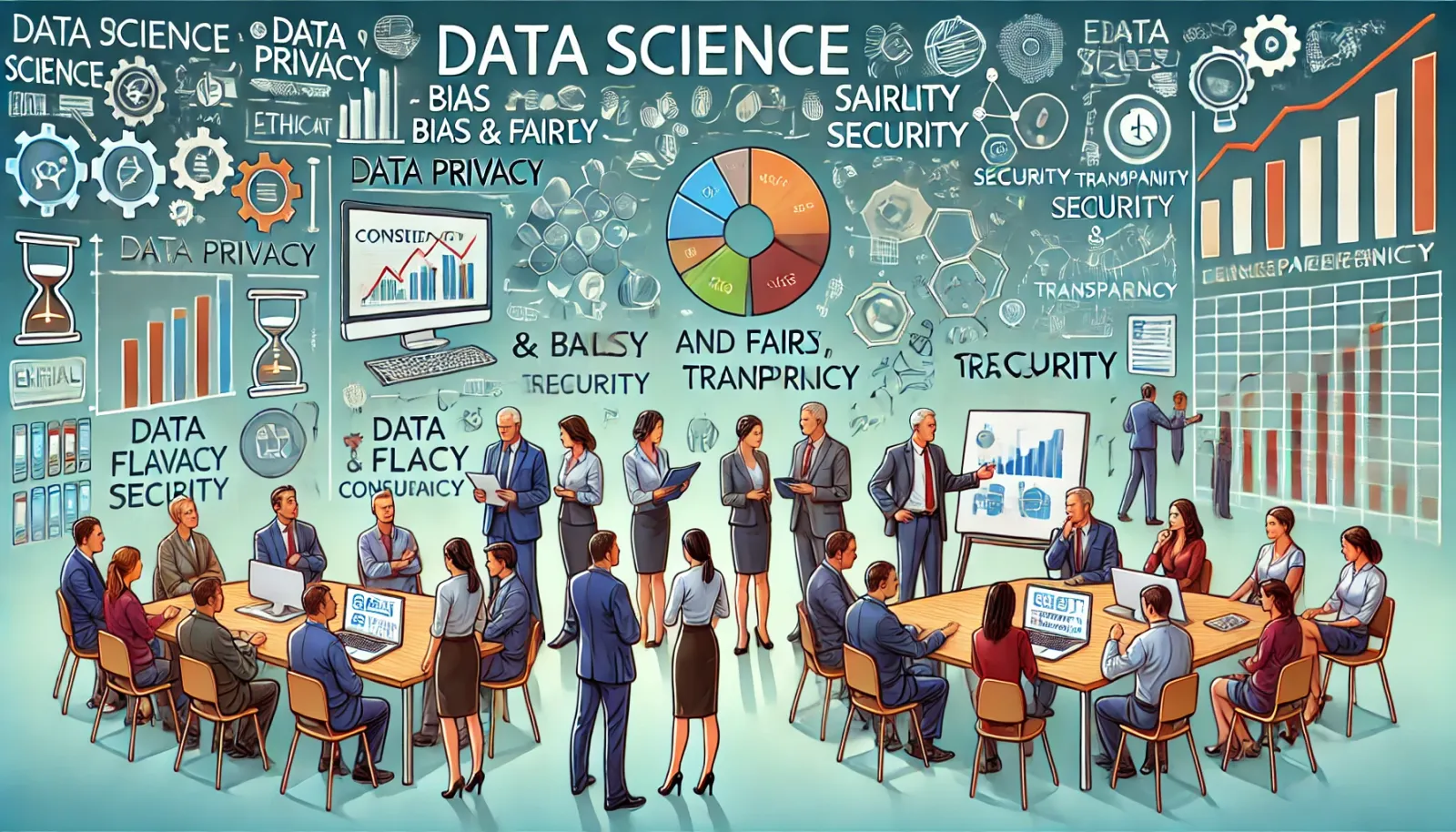⚖️ 1.7 Ethical Considerations in Data Science

As Data Science becomes increasingly integrated into various aspects of society, ethical considerations play a crucial role in ensuring that data is used responsibly. This section will explore key ethical issues and best practices in Data Science.
🔐 1.7.1 Data Privacy
Protecting individuals' privacy is a fundamental ethical concern in Data Science. It involves ensuring that personal data is collected, stored, and used in a way that respects individuals' rights.
- Personal Data: Includes any information that can identify an individual, such as names, addresses, or social security numbers.
- Anonymization: The process of removing personally identifiable information (PII) from data sets to protect individual privacy.
- Regulations: Data privacy laws such as the General Data Protection Regulation (GDPR) in Europe and the California Consumer Privacy Act (CCPA) in the United States set guidelines for how personal data should be handled.
🔄 1.7.2 Data Ownership and Consent
Understanding who owns the data and ensuring that it is collected and used with proper consent are critical ethical considerations.
- Data Ownership: Refers to the legal rights and responsibilities surrounding the control and use of data. Individuals or organizations that own data have the right to control how it is used.
- Informed Consent: Involves obtaining permission from individuals before collecting or using their data. Consent should be informed, meaning individuals are fully aware of what their data will be used for.
📊 1.7.3 Bias and Fairness
Bias in data and algorithms can lead to unfair and discriminatory outcomes. Ethical Data Science practices aim to minimize bias and ensure fairness.
- Algorithmic Bias: Occurs when a machine learning model reflects the biases present in the data it was trained on, leading to biased predictions.
- Fairness: Ensuring that algorithms do not favor one group over another and that outcomes are equitable across different demographics.
- Mitigating Bias: Techniques such as re-sampling data, using fairness-aware algorithms, and conducting thorough bias audits can help reduce bias in models.
🌐 1.7.4 Transparency and Explainability
Transparency in Data Science involves making data practices clear and understandable, while explainability refers to the ability to explain how a model makes its decisions.
- Transparency: Being open about data sources, methods, and the purposes of data collection and analysis. Transparency builds trust and accountability.
- Explainability: The ability to explain how a machine learning model arrives at a particular decision or prediction. Techniques like feature importance and model interpretation tools can help achieve this.
- Black Box Models: Some complex models, like deep neural networks, are often referred to as "black boxes" because their inner workings are not easily interpretable. Efforts are ongoing to make these models more explainable.
🛡️ 1.7.5 Security and Data Protection
Ensuring that data is secure from unauthorized access and breaches is a key ethical responsibility in Data Science.
- Data Security: Involves protecting data from cyber threats and breaches through encryption, secure storage, and access controls.
- Data Breaches: Incidents where sensitive data is accessed without authorization. Data breaches can have severe consequences, including financial loss, reputational damage, and legal penalties.
- Best Practices: Implementing strong security measures, conducting regular audits, and educating teams about data security are essential practices to protect data.
🔍 1.7.6 Accountability and Responsibility
Data Scientists have a responsibility to ensure that their work is ethical and accountable. This involves being aware of the potential impacts of their work and taking steps to mitigate any negative consequences.
- Professional Ethics: Data Scientists should adhere to ethical guidelines and codes of conduct that emphasize integrity, objectivity, and respect for individuals' rights.
- Accountability: Ensuring that there are clear lines of accountability for decisions made using data. This includes documenting processes, decisions, and the rationale behind them.
- Ethical AI: The development and deployment of AI systems should consider potential ethical implications, including the impact on employment, privacy, and societal norms.
🌍 1.7.7 Social Impact
Data Science has the potential to significantly impact society, both positively and negatively. Ethical considerations should include an assessment of the broader social implications of data projects.
- Positive Impact: Data Science can be used for social good, such as improving healthcare, reducing poverty, and fighting climate change.
- Negative Impact: Misuse of data can lead to privacy violations, discrimination, and other social harms. It is essential to consider these potential impacts and take steps to prevent them.
- Ethical Frameworks: Implementing ethical frameworks and conducting impact assessments can help guide the responsible use of data in society.
🎁Resource:
- Data Privacy and Protection in Data Science - CIO : An article discussing the importance of data privacy and protection, including regulations like GDPR and CCPA.
- Understanding Algorithmic Bias - IBM : A resource that explains what algorithmic bias is and how it can be mitigated in machine learning models.
- Ethical AI and Explainability - World Economic Forum : An article on the significance of transparency and explainability in AI systems.
- Data Security Best Practices - Microsoft : A guide to best practices in data security, covering encryption, access control, and more.
- Social Impact of Data Science - UC Berkeley School of Information : An exploration of the social implications of data science, highlighting both the potential benefits and risks.